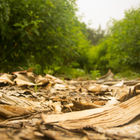
Beyond regenerative agriculture
Regenerative agriculture is a farming approach and philosophy that has gained significant attention in policy, while also finding growing application in farming practices. In principal following organic agricultural principles, proponents of regenerative agriculture often point out their specific attention to soil health and the overall regeneration of ecosystems where farming takes place. There are often overlaps in principles, practices and communities with organic farming, agroecology, agroforestry, permaculture, Indigenous farming practices, and the like. Some, like the ecovillage community of the Schloss Tempelhof in Southern Germany, prefer the term "Aufbauende Landwirtschaft," meaning a form of "(re)building" agriculture that goes beyond regenerating an existing farming system.
In this context, I research how regenerative agriculture / Aufbauende Landwirtschaft is practised at the farming community of the Schloss Tempelhof, where I conducted ethnographic research as an intern in summer 2020. I am guided by the question what is considered innovative, how and what forms of (dyi) tools and technologies farmers and gardeners use (e.g. mulching, intercropping, foiling, etc.), and how this relates to farming techniques they develop tinkering with new approaches. Other issues that emerged from this study was the motivation of young farmers and gardeners aspired to change the current agricultural system through their own work. Another issue was the social interaction of weekly helping volunteers with the farming-gardening community and the negotiation of what I call the 'urban gaze,' also in the context of the Covid-19 pandemic. The research project is part of the research project "Innovating Food, Innovating Europe?" that is funded by the German Research Foundation (DFG).



















